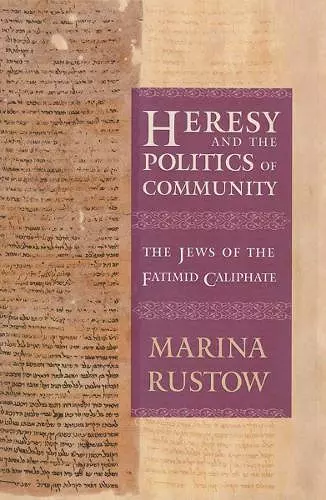Heresy and the Politics of Community
The Jews of the Fatimid Caliphate
Format:Paperback
Publisher:Cornell University Press
Published:31st Oct '14
Currently unavailable, and unfortunately no date known when it will be back
This paperback is available in another edition too:
- Hardback£67.00(9780801445828)

In a book with a bold new view of medieval Jewish history, written in a style accessible to nonspecialists and students as well as to scholars in the field, Marina Rustow changes our understanding of the origins and nature of heresy itself. Scholars have long believed that the Rabbanites and Qaraites, the two major Jewish groups under Islamic rule, split decisively in the tenth century and from that time forward the minority Qaraites were deemed a heretical sect. Qaraites affirmed a right to decide matters of Jewish law free from centuries of rabbinic interpretation; the Rabbanites, in turn, claimed an unbroken chain of scholarly tradition.
Rustow draws heavily on the Cairo Geniza, a repository of papers found in a Rabbanite synagogue, to show that despite the often fierce arguments between the groups, they depended on each other for political and financial support and cooperated in both public and private life. This evidence of remarkable interchange leads Rustow to the conclusion that the accusation of heresy appeared sporadically, in specific contexts, and that the history of permanent schism was the invention of polemicists on both sides. Power shifted back and forth fluidly across what later commentators, particularly those invested in the rabbinic claim to exclusive authority, deemed to have been sharply drawn boundaries. Heresy and the Politics of Community paints a portrait of a more flexible medieval Eastern Mediterranean world than has previously been imagined and demonstrates a new understanding of the historical meanings of charges of heresy against communities of faith. Historians of premodern societies will find that, in her fresh approach to medieval Jewish and Islamic culture, Rustow illuminates a major issue in the history of religions.
Rustow's book provides us fascinating new insights into the history of Jewish Eastern communities of Egypt, Syria, and Palestine during the crucial and politically unstable period of the rule of the Fatimid caliphs.... Her focus on documentary and epistolary sources and on the caliphal administration allows Rustow to present a picture of Rabbanite-Karaite relations which differs from the more standard views of modern scholarship... that present Karaism as a separatist 'sect' and a threat to Judaism.... On the contrary, Rustow shows, the Karaites constituted one among other Jewish groups of the period and were fully engaged in Jewish community life as a whole.
* Journal of Jewish Studies *The Cairo Geniza documents have been at the center of Jewish scholarship for over a century. Rustow has reviewed the medieval and modern models that emerged on the basis of the rich polemical literature and challenges them against the extant contemporary correspondence that describe the actual interactions.... This well-written and reader-friendly major contribution is accessible to neophyte and scholar alike, and will engender a new, nuanced view of the social relations among Jews and Muslims in the medieval Mediterranean. Highly recommended.
* Choi- Winner of Winner of the 2008 Salo W. Baron Prize (American A.
ISBN: 9780801456503
Dimensions: 254mm x 178mm x 25mm
Weight: 907g
472 pages